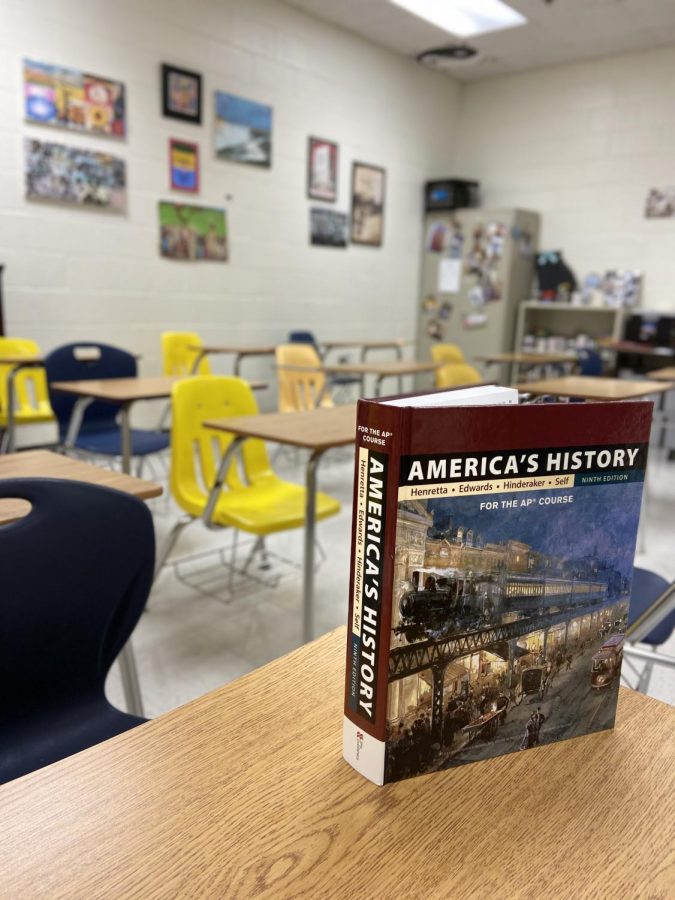AP Exams In-Person: Apparently Probable!
Will classrooms sit empty or will they be filled with AP test takers this May? Photo credit: Claire Mulkey
February 18, 2021
AP exam season is almost here. It seems impossible that close to a year has passed since COVID-19 forced itself into the world, but nevertheless, it is true. It’s hard to name anything that hasn’t been touched by the hands of COVID-19: sports, school, graduation, etc. Most events and organizations have had to revolutionize their traditional methods to adjust to CDC guidelines. However, in this year of ‘unprecedented times,’ the College Board has reverted back to their original pre-coronavirus ways. AP exams are scheduled for their usual weeks in May and at this point and time, will be full length and in-person. This decision begs the question: is it fair to have a normal test if this year has been anything but normal?
Last year, the AP exams in 2020 were virtual and significantly modified. Exams that usually lasted three or more hours were shortened to one. Tests that were formerly composed of three essays and a multiple choice portion were reduced to just one essay. In theory, these tests should be easier to complete, but in many cases, actually had adverse effects. Only one essay, one DBQ, or one FRQ would determine the student’s entire score. Before, the multiple sections made up varying percentages of a student’s score, but in the spring of 2020, 100% of the student’s grade depended on one question or prompt. This process in no way accurately reflected the entire year of learning and studying that the student endured.
College Board either decided last year’s testing was not fair or received enough complaints that they decided to change their testing method this year. The AP Central College Board website states that their plan this year is to “offer in-person testing,” but if “a school is closed or coronavirus-related risks prevent a student from testing at school,” a special online test will be administered to them via the AP coordinator. The online test will be full-length, though, not the shortened version from last year.
Students have mixed emotions about the College Board’s announcement. It is surprisingly refreshing to have something that resembles normalcy, but this year has been anything but normal. Many AP classes are behind schedule or have had to cut out certain activities and assignments that they did pre-COVID-19, like books, labs, or projects. Freshman Hannah Newton thinks that the tests shouldn’t be standard, since students have missed out on curriculum during online learning. The shortened 40-minute class periods were helpful during online learning, but when it comes to the AP exams, will likely prove to be harmful.
Junior Emma Martin, who took AP exams last year and will take them this spring, says that “this school year can’t compare to any other year, whether in current events or in education, so we shouldn’t be compared to students from previous years.” AP Chemistry teacher Christi Chilton agrees. She believes the “material covered on the test should be shortened” but that the in-person option is much better than the URL test last year. For AP Chemistry especially, the 2020 exams were a hit-or-miss. The students were given a single FRQ, some of which were easy and some of which covered obscure material. Mrs. Chilton is hopeful that her students this year will be given a more fair chance.
Other students don’t mind the curriculum imbalance from this year to years past. Junior Caroline Kardian says she feels like the year has been different, but agrees with taking a normal exam, as long as it is in person. It is difficult to judge just how much information students have missed out on this year, but it’s likely that the AP scores will expose those gaps in knowledge. Juniors Matthew House and Beau Thacker feel strongly that the exams should be in-person, because “the people taking the test in-person will be disadvantaged, since the kids at home have all the resources to cheat.” Rampant cheating is another problem to arise out of URL-based learning during the COVID-19 pandemic. Cheating is likely a big factor in the College Board’s decision to hold tests in-person.
Students have been subjected to great change and upheaval this year. They have missed school and some students have yet to step into the building. All over the U.S., schools are handling CDC guidelines differently, yet are expected to test the same way. However, most agree that in-person tests are the best possible option. So, the verdict is in: the AP exams should be in-person and limited in curriculum, though not as structurally altered as last year.
Click here to see how other aspects of school are affected by COVID-19.


